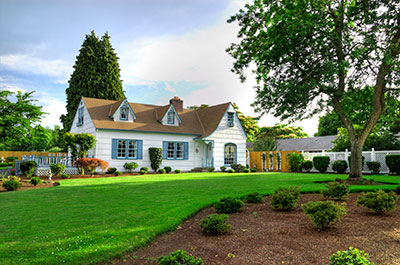 If you're looking for homeowner's insurance, you're undoubtedly curious about how the insurer calculates your premium. Some consumers have the misconception that home insurance is a fixed cost. In truth, home insurance prices are tailored to the individual needs of each homeowner.
If you're looking for homeowner's insurance, you're undoubtedly curious about how the insurer calculates your premium. Some consumers have the misconception that home insurance is a fixed cost. In truth, home insurance prices are tailored to the individual needs of each homeowner.
Unlike auto insurance, homeowner insurance requires a great deal of data! You'll need your house's measurements, construction specifications, and information on any extras like separate buildings, swimming pools, or trampolines.
According to the National Association of Insurance Commissioners, the national average yearly homeowner's insurance price is $1,249. Earthquakes. Wildfires. Floods. California has its share of natural disasters, which means it's important to find the best homeowners insurance to cover your home.
We recommend having your agent shop around with various insurers because the lowest cost may not be the best for your coverage needs. Here are some of the many factors that go into making up your home insurance premiums, not in any order of importance.
Your Deductibles
The amount you pay toward a claim before your insurance company settles a claim is known as a deductible. Choosing the appropriate deductible amount is a significant choice. The larger the deductible, the lower your premium will be.
The Replacement Cost of Your Home
The cost of replacing your home with construction materials of equivalent type and quality is referred to as replacement cost. The replacement cost, also known as rebuild value, of your property is determined by characteristics such as its age, square footage, architectural style, number of rooms, and local rebuild costs per square foot. Market value, which includes the land value as well as the home's rebuild cost, is not the same as the replacement cost.
Claims History
Patterns of behavior are frequently used by insurance firms to make choices. When a homeowner files a claim, the insurance company anticipates what is the likelihood of having a claim in the future. A frequent history of filing claims could imply that the insurance company faces an even more considerable risk.
Age and Condition of Your Home
Insurance premiums for older, run-down properties are typically higher than for newer, well-maintained ones. Some insurance companies even provide discounts for newly constructed homes.
Location
The amount you pay in premiums is influenced by where you live. If your zip code is near a location with a history of risks like vandalism, theft, or weather-related disasters, the cost of your coverage may rise. However, if you live near a fire station, for example, your location may have a lower rate.
Added Coverage For Unique Exposures
If you have a pool, trampoline, or other unique risks, you will typically pay more. You may also pay more if you own uncertain dog breeds.
The Type of Coverage You select
There are various sorts of homeowner's insurance policies, and the one you choose will have an impact on your rate. Because most home insurance policies contain liability coverage, the main distinction is the level of coverage provided for your home and personal items.
Condition of Your Roof
The condition of a home's roof will affect the cost of the homeowner's insurance. The state of your roof has an impact on your homeowner's insurance. Houses with newer roofs will generally pay less, while those with older roofs may pay more. Any time you make a home modification, particularly replacing or repairing a roof, you should check with your insurance agent to make sure you're protected and to take advantage of any potential discounts.
Safety or Security Features
Home security systems, fire sprinklers, impact-resistant garage doors and windows, water-leak sensors, and other preventative features can result in insurance cost reductions.
Buying insurance should be an important part of your financial planning. It is important to consider many different things in order to obtain the best possible combination of coverage, price, and service.
Insurance companies use many different factors when reviewing your risk. It is important to understand some of these as you make your personal insurance decisions.
Bridgeway Insurance Services is passionate about providing customized insurance solutions to our clients. Nothing we do is “standard”. We understand each client is unique and deserves solutions that meet their needs.